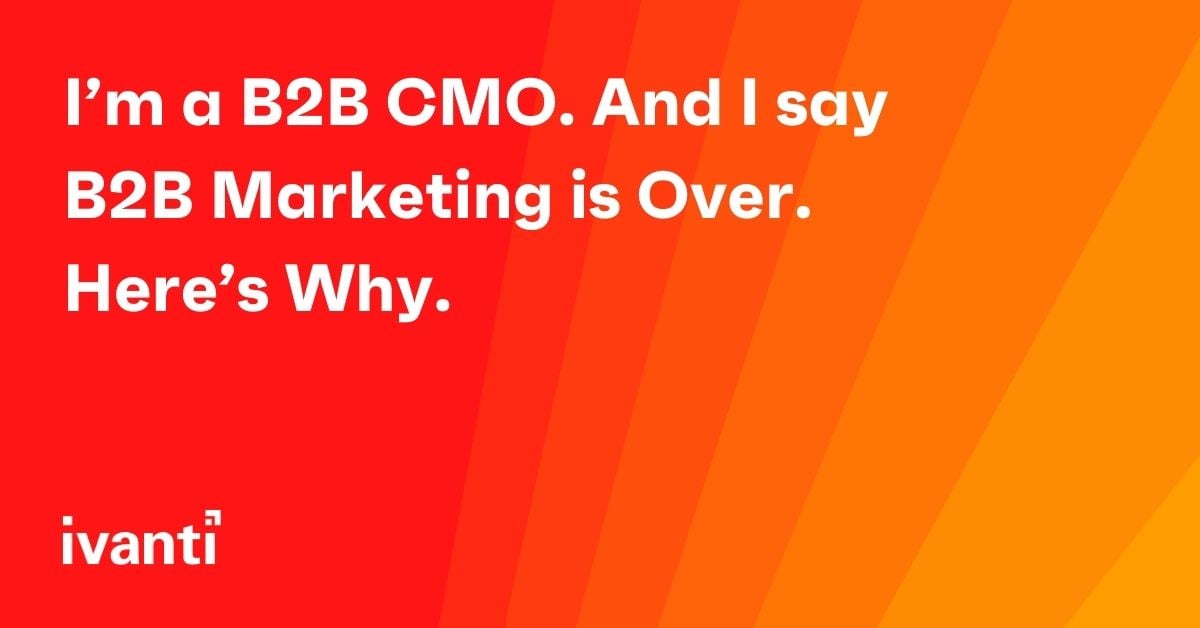I’m a B2B CMO. And I say B2B Marketing is Over. Here’s Why.
At the beginning of 2020, most of us in the marketing industry had a pretty solid – and siloed – understanding of B2B and B2C marketing.
B2B is rational.
B2C is about emotions.
B2B is about long-term partnerships and moving along the funnel.
B2C thrives on impulse.
B2B hinges on appealing to a group of stakeholders.
B2C hinges on capturing the imagination and attention of an individual.
The beginning of 2020 was a lifetime ago.
And B2B marketing is ancient history.
The pandemic catalyzed a dramatic marketing shift, and key elements of that shift will be permanent.
Marketing must engage people, not personas.
Pre-pandemic, it was easy to think of a B2B prospect as an entity or a collection of personas characterized by data points. Better marketing hinged on better data. And then some more data. So. Much. Data.
Since then, the traditional business structure has disassembled across many industries. As organizations everywhere scrambled to rethink how to react and survive, roles shifted, hierarchies compressed and new perspectives emerged.
Business is being humanized.
Data is still a critical component of marketing, but data must be used to create understanding, not personas. There used to be some value in delivering messages that were sufficiently vague to appeal up the entire decision chain. Now, we’ve seen how possible it is to create a complex network of connections across the digital landscape. We have no excuse not to leverage those connections to engage with stakeholders as individuals with their own insights and experiences.
If this sounds familiar…
B2C marketing has become hyper-customized over the last few years. End users expect to be recognized, understood and catered to as individuals. This isn’t entitlement; it’s a product of digital capabilities that made instantaneous responsiveness a baseline expectation.
Savvy marketers target solving customers’ problems, quickly and efficiently. These marketers eschew traditional, stale sales tactics because customers resist them. Customers don’t want to be manipulated or “sold” to.
And neither do business stakeholders.
Business stakeholders are, after all, people. They are consumers who have leveled up expectations for responsiveness, immediacy and personalization in every area of their lives. So why do we treat them like they’ll behave any different when it comes to business?
The answer: we shouldn’t. Business stakeholders will become immune to traditional sales tactics. They’re wise to cold, data-driven pitches. They want quantifiable ROI, of course, but it needs to consider the nuances of the company and the people involved. Location-agnostic competition means everyone is “up against” everyone else and it’s not sustainable to play a numbers game where you try to barely inch past a competitor’s offer.
Successful marketers will guide prospects through an EQ-laden business process based on a deeper understanding of unique pain points, capabilities and goals. It’ll be compelling, not pushy. Approachable, not condescending. Creative, not formulaic.
We’re at an inflection point, where the challenges of the pandemic can either continue to produce reactive scrambling or inform a smarter path forward. The latter requires doing away with B2B marketing as we know it.

